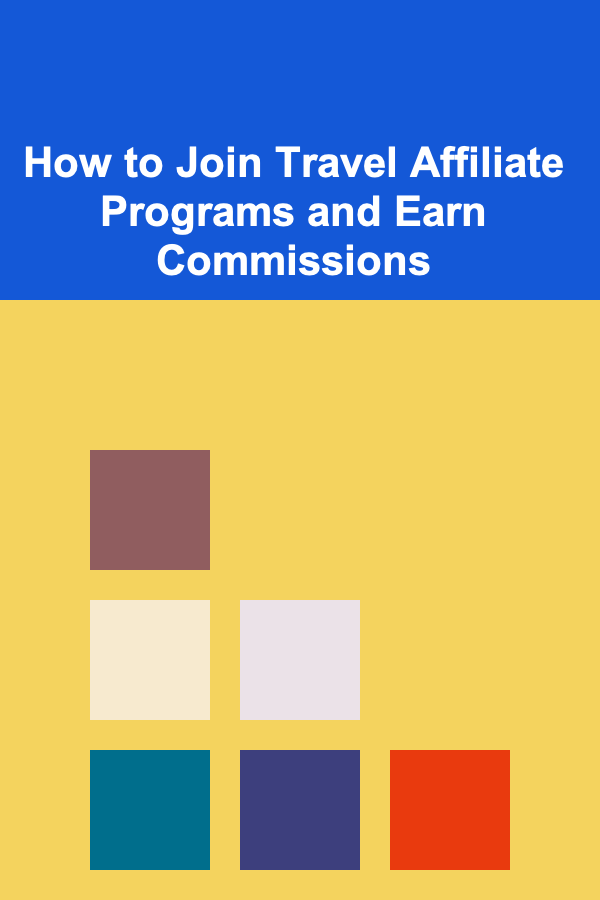
How to Join Travel Affiliate Programs and Earn Commissions
ebook include PDF & Audio bundle (Micro Guide)
$12.99$5.99
Limited Time Offer! Order within the next:

Affiliate marketing has become one of the most popular and effective ways for individuals to earn passive income, especially in the travel industry. Travel affiliate programs allow you to earn commissions by promoting travel-related services, such as hotels, flights, car rentals, vacation packages, and travel gear. With the rise of online travel bookings, travel affiliate programs have become an excellent opportunity for anyone with a blog, website, or social media following to monetize their platforms.
In this actionable guide, we'll explore the step-by-step process of joining travel affiliate programs and earning commissions. Whether you're a seasoned travel blogger or just starting out in the affiliate marketing world, this guide will give you the knowledge and tools to start earning from travel-related affiliate links.
Step 1: Understand How Affiliate Marketing Works
Before diving into specific travel affiliate programs, it's essential to understand how affiliate marketing works.
Affiliate marketing is essentially a performance-based marketing model. When you join an affiliate program, you receive a unique affiliate link. This link tracks the traffic and sales generated by your referrals. When someone clicks on your affiliate link and makes a purchase or booking, you earn a commission. The commission is typically a percentage of the sale price or a fixed fee.
Key Terms in Affiliate Marketing:
- Affiliate Link: A unique URL provided by the affiliate program to track your referrals.
- Commission: The money you earn when someone makes a purchase or booking through your affiliate link.
- Conversion Rate: The percentage of clicks on your affiliate links that result in a successful sale or booking.
- Cookie Duration: The length of time the affiliate link tracks a visitor's activity after they click on your link. For example, if a program has a 30-day cookie, you earn a commission if the visitor books a trip within 30 days of clicking your link.
Step 2: Choose Your Niche and Audience
One of the first steps in affiliate marketing is identifying your niche and target audience. In the travel industry, there are numerous niches you could focus on, such as:
- Luxury travel
- Budget travel
- Adventure travel
- Family travel
- Solo travel
- Eco-friendly travel
- Travel gear and accessories
Your niche will define the kind of affiliate programs you'll join and the products or services you'll promote. It's also essential to have a clear understanding of your audience's preferences and needs. For example, if your audience consists mostly of budget travelers, you might want to promote affordable flights, hostels, and budget-friendly destinations.
Tailoring your content and affiliate programs to your audience's interests will help you generate higher conversion rates.
Step 3: Research and Join Travel Affiliate Programs
Now that you've defined your niche and audience, it's time to start looking for travel affiliate programs to join. Many travel-related companies offer affiliate programs, and the opportunities are vast. Some of the top categories include:
1. Booking Platforms (Hotels, Flights, Car Rentals)
Many popular travel booking platforms offer affiliate programs that allow you to earn commissions on bookings made through your referral links. Some notable examples include:
- Booking.com Affiliate Program: Offers commissions on hotel and vacation rentals bookings.
- Expedia Affiliate Program: Provides commissions for bookings of hotels, flights, car rentals, and activities.
- Airbnb Affiliate Program: Allows you to earn money by referring hosts and travelers to the platform.
2. Travel Insurance
Travel insurance is an essential product for many travelers, and there are several affiliate programs that provide commissions for each policy sold:
- World Nomads Affiliate Program: Offers travel insurance for adventurous travelers, and you can earn commissions by referring customers.
- Allianz Travel Insurance Affiliate Program: Another popular option for promoting travel insurance policies.
3. Tours and Experiences
Many travelers seek out local experiences, guided tours, and activities. You can promote these types of services and earn commissions when users book their tours through your affiliate links:
- GetYourGuide Affiliate Program: Offers tours, activities, and experiences in destinations around the world.
- Viator Affiliate Program: A leading platform for booking tours and experiences.
4. Travel Gear and Equipment
Travel gear, such as luggage, backpacks, cameras, and other accessories, are essential for many travelers. There are affiliate programs for travel gear, making it a lucrative niche to tap into:
- Amazon Associates: Amazon has a wide range of travel products, and you can earn commissions by recommending these items to your audience.
- Backcountry Affiliate Program: Focused on outdoor adventure gear, which can be perfect for promoting to eco-travelers and adventure seekers.
5. Travel Apps
In the digital age, travel apps are essential for travelers. Many travel apps, such as navigation tools, itinerary planners, and currency converters, have affiliate programs. Examples include:
- Skyscanner Affiliate Program: A popular flight comparison tool that provides users with the best deals on air travel.
- TravelPayouts: An affiliate network with access to several travel-related affiliate programs, including flights, hotels, car rentals, and more.
How to Apply
To apply to most travel affiliate programs, you'll need to fill out an application form. The process may vary slightly, but common requirements include:
- A website or blog with content focused on travel (or a significant social media presence).
- A description of your audience and how you plan to promote their products.
- Some programs may also require a minimum amount of website traffic or social media following.
Once you're accepted into an affiliate program, you'll be provided with unique affiliate links and banners to use in your marketing.
Step 4: Promote Your Affiliate Links Effectively
Joining a travel affiliate program is just the beginning. To earn commissions, you need to effectively promote your affiliate links. Here are some proven strategies to get the most out of your affiliate marketing efforts:
1. Create Valuable Content
Content is key to successful affiliate marketing. Focus on providing value to your audience by creating high-quality content that addresses their travel needs and interests. Some content ideas include:
- Destination Guides: Write detailed guides about popular destinations and include affiliate links for hotels, tours, and activities.
- Travel Tips: Offer advice on budget travel, solo travel, packing tips, and more, linking to products and services that will help your audience.
- Product Reviews: Write honest reviews of travel gear or services you've used, providing affiliate links to those products.
2. Use Engaging Visuals
People love visuals, especially when it comes to travel. Share stunning travel photos, videos, and infographics on your website and social media channels. Use your affiliate links in your captions or video descriptions, encouraging your audience to click and book through your links.
3. Leverage Social Media
Social media platforms like Instagram, Facebook, Twitter, and Pinterest are powerful tools for affiliate marketing. Share travel-related posts, stories, and images, along with your affiliate links. You can also collaborate with travel brands for sponsored posts that include affiliate links.
4. Email Marketing
Building an email list can help you connect with your audience on a more personal level. Send newsletters with travel tips, destination highlights, and affiliate offers. Include your affiliate links in your email campaigns and ensure that your subscribers know they can benefit from clicking through your links.
5. Paid Advertising
If you have the budget, paid advertising can be an effective way to promote your affiliate links. Google Ads, Facebook Ads, and Instagram Ads allow you to target specific demographics and interests, driving traffic to your website or landing page where your affiliate links are displayed.
Step 5: Track Your Performance and Optimize
Once you're actively promoting your affiliate links, it's crucial to track your performance. Most affiliate programs provide dashboards where you can monitor clicks, conversions, and commissions. By analyzing this data, you can determine which strategies are working and which need improvement.
Key Metrics to Monitor:
- Click-Through Rate (CTR): The percentage of people who clicked on your affiliate links compared to the number of impressions.
- Conversion Rate: The percentage of visitors who made a purchase or booking after clicking on your affiliate link.
- Revenue: The total earnings generated from affiliate commissions.
Use this data to optimize your content, promotional strategies, and even test different affiliate programs to see which ones provide the highest earnings.
Conclusion
Joining travel affiliate programs and earning commissions is a fantastic way to monetize your travel-related content. By selecting the right programs, creating engaging content, and promoting your affiliate links effectively, you can generate a steady stream of passive income. With the right strategy and patience, affiliate marketing in the travel niche can become a sustainable and profitable business.

How to Conduct a Weekly Review to Stay on Track
Read More
How to Market Your Automotive and DIY Products with Influencers: An Actionable Guide
Read More
How to Sell Digital Products Successfully For Journalists: An Actionable Guide
Read More
How to Store Seasonal Items in Your Car Safely
Read More
How to Use Raised Planters for Accessibility and Organization
Read More
Understanding the Role of Biomass in Energy Production
Read MoreOther Products

How to Conduct a Weekly Review to Stay on Track
Read More
How to Market Your Automotive and DIY Products with Influencers: An Actionable Guide
Read More
How to Sell Digital Products Successfully For Journalists: An Actionable Guide
Read More
How to Store Seasonal Items in Your Car Safely
Read More
How to Use Raised Planters for Accessibility and Organization
Read More